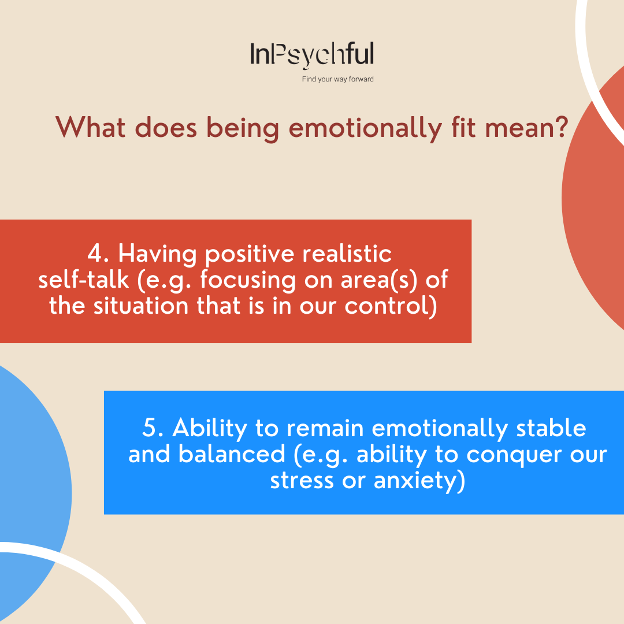
Have you ever thought about what success means to you? In our Asian context, common definitions of success would be academic and career accomplishments. However, we may soon realize that such focus may not be the best way to succeed as the world changes rapidly more than ever. In a broader sense, there are some skills that may be able to serve our youths better as they face different types of challenges today. One of such skills is emotional fitness, which can be important in the youths’ success not just in academics, but in life. Before we move on, you may not have heard of this term previously, so let’s find out what emotional fitness actually mean.
What does being emotionally fit mean?
In InPsychful, we define Emotional Fitness as the ability to use our emotional states as information, to help us better navigate through challenges which can lead to better choices in making decisions while in a calm or less emotionally aroused state. In order to be emotional fit, individuals need to possess these five skill sets:
- Ability to identify, express, and regulate their emotions
- Identify and understand emotions of others
- Ability to seek social support, and the individual’s coping methods
- Having positive realistic self-talk.
- Ability to create, maintain, and adjust goals according to situational factors
Just like how our bodies require regular exercise, to remain healthy, we too need emotional fitness to maintain our mental health! When we build emotional fitness, we will be able to focus our attention towards achieving success in life!
Why do youths need emotional fitness?
You may be wondering why these components of emotional fitness are important for youth. Firstly, research has shown that individuals who are able to recognize, understand, regulate, and manage their emotions have a higher likelihood of experiencing better psychological wellbeing and maintain a positive state of mental health (Mayer & Salovey, 1997; Salovey & Mayer, 1990).
Youths are in a stage of their lives where they are going through the development of neuropsychological and physical aspects and studies have found that these are linked to the emergence of mental disorders (Kessler et al., 2005). Individuals who can seek social support have been found to encounter less mental health problems, such as depression, anxiety, hostility and better physical health and longevity (Cohen & Syme, 1985; House et al., 1988, Vandervoort, 1999). Additionally, it was found that having social support is important in establishing resilience in the workplace (Collins, 2008; Wilks & Spivey, 2009). This will be useful for the youths as they continue to develop themselves emotionally over the years.
Having a positive and realistic self-talk is crucial for emotional fitness, and ultimately the youths’ success. What is self-talk you may ask? Self-talk is one where an individual talks to oneself aloud or silently (Siegrist, 1995). It was found that self-talk can help to regulate and enhance emotions (Zinsser, 2010). Self-talk increases a person’s awareness of one’s emotions and behaviours which in turn helps in cognitive and regulatory functions (Brinthaupt et al., 2009; Winsler & Naglieri, 2003). In other worlds, having self-talk helps to improve one’s psychological learning and development (Morin, 2005).
Additionally, it was found that the ability to remain emotionally stable and balanced has contributed to psychological wellbeing (Lamers et al., 2012; Kokko et al., 2013). A study has shown that being emotionally unstable is a strong predictor for negative emotions and is linked to lower levels of happiness and quality of life (Steel et al., 2008).
People with high emotional fitness have a greater ability to view challenges as manageable instead of being overwhelmed. These individuals have greater mental and emotional resources to spring back from setbacks and come back stronger. Thus, being emotionally fitness can contribute to success of youths in the future.
How does being emotionally fit lead youths to success?
Now that you understand more about why youths need emotional fitness, how exactly does being emotionally fit lead youths to success? By being emotionally fitn, youths can have control of their emotions, react less intensely, and are able to calm themselves more quickly and are more accepting towards emotional states instead of fighting against them. It was found that successful people demonstrate a strong capability of regulating their emotions (Camins, 2020). When individuals are able to seek social support, this leads to better physiological health. For example, a study has found that individual who are socially supported have lower increases in heart rate, blood pressure and cortisol level when performing mental arithmetic and public speaking tasks (Ozbay, et al., 2007). This helps the individual remain calm during difficult tasks. By having self-talk, you will learn how to recognize your types of negative thinking, you can work to turn them into positive thinking (Legg, 2020) This will then help to set the stage for success in the future.
So, are you ready to learn how emotional fitness can help your child overcome exam stress and anxiety? Stay tuned for more information about our upcoming programme!
Camellia Wong, MA., Tan Khai Teng
More Articles
Reference
Camin, S. (2020, July 13). Emotional Regulation: A Key Component of Success. Road to Growth Counselling. https://roadtogrowthcounseling.com/emotional-regulation-a-key-component-of-success/
Cohen, S., & Syme, S. L. (1985). Social Support and Health (pp. xvii, 390). Academic Press.
Collins, S. (2008). Statutory Social Workers: Stress, Job Satisfaction, Coping, Social Support and Individual Differences. British Journal of Social Work – BRIT J SOC WORK, 38, 1173–1193. https://doi.org/10.1093/bjsw/bcm047
House, J. S., Landis, K. R., & Umberson, D. (1988). Social Relationships and Health. Science, 241(4865), 540–545.
Kessler, R. C., Berglund, P., Demler, O., Jin, R., Merikangas, K. R., & Walters, E. E. (2005). Lifetime prevalence and age-of-onset distributions of dsm-iv disorders in the national comorbidity survey replication. Archives of General Psychiatry, 62(6), 593. https://doi.org/10.1001/archpsyc.62.6.593
Kokko, K., Tolvanen, A., & Pulkkinen, L. (2013). Associations between personality traits and psychological well-being across time in middle adulthood. Journal of Research in Personality, 47(6), 748-756.
Lamers, S. M., Westerhof, G. J., Kovács, V., & Bohlmeijer, E. T. (2012). Differential relationships in the association of the Big Five personality traits with positive mental health and psychopathology. Journal of Research in Personality, 46(5), 517-524.
Legg, T. J. (2020, June 26). Positive Self-Talk: How Talking to Yourself Is a Good Thing. Healthline. https://www.healthline.com/health/positive-self-talk
Mayer, J. D., & Salovey, P. (1997). What is emotional intelligence? In Emotional development and emotional intelligence: Educational implications (pp. 3–34). Basic Books.
Morin, A. (2005). Possible links between self-awareness and inner speech.
Ozbay, F., Johnson, D. C., Dimoulas, E., Morgan, C. A., Charney, D., & Southwick, S. (2007). Social Support and Resilience to Stress. Psychiatry (Edgmont), 4(5), 35–40. https://www.ncbi.nlm.nih.gov/pmc/articles/PMC2921311/
Salovey, P., & Mayer, J. D. (1990). Emotional Intelligence. Imagination, Cognition and Personality, 9, 185–211.
Steel, P. , Schmidt, J. & Shultz, J. (2008). Refining the Relationship Between Personality and Subjective Well-Being. Psychological Bulletin, 134 (1), 138-161. doi: 10.1037/0033-2909.134.1.138.
Vandervoort, D. (1999). Quality of social support in mental and physical health. Current Psychology, 18(2), 205–221. https://doi.org/10.1007/s12144-999-1029-8
Wilks, S. E., & Spivey, C. A. (2009). Resilience in Undergraduate Social Work Students: Social Support and Adjustment to Academic Stress. Social Work Education, 29(3).




